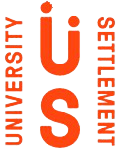As New York City’s response to the outbreak of COVID-19 (coronavirus) evolves, University Settlement is sharing this update about how our programs and operations are affected as of Monday, March 16,
The situation continues to change quickly, and we are adjusting and planning in real-time.
- As of today, the New York City Department of Education has closed all public schools through at least April 20th.
- As with other DOE closures, when the DOE is closed, University Settlement’s Early Childhood and After-School programs are also closed.
- Our Cornerstone sites – Ingersoll Community Center, Atlantic Terminal, and Campos Plaza – are also closed today. Please stay tuned for further information.
- At Houston Street Center, we have ramped down all programming, and we will have only a skeleton crew on site Monday to continue planning.
- New York City’s Senior Centers and NORC social and congregate activities and meals are also now closed, except for meal pick-up and telephone-based assistance to members.
- Our programs for Older Adults, including the Neighborhood Center, Meltzer Center, and our Village View NORC program had anticipated this last week and have plans in place to work in accordance with this direction from the City. We will continue Meals on Wheels services.
As the University Settlement team transitions in response to program closures, the following buildings will be open today to provide essential services, including case management, mental health, and housing or income assistance.
- 184 Eldridge Street
- 189 Allen Street
—
Public health officials are recommending that organizations and individuals take steps to support “social distancing” in order to prevent further spread of COVID-19 (coronavirus).
Our closures, and the city’s efforts, are meant to support social distancing. We recommend that members of the University Settlement community do what they can to do so, as well. Stay home as much as possible, and limit social gatherings in person. Please talk to your family, friends, neighbors, and colleagues about the importance of changing individual behavior, immediately, so that we as a city can protect those most at risk. Not everyone can stay at home, but the more people who do, the safer everyone is.
Other steps you can take to respond to COVID-19 (coronavirus):
- Get your flu shot
- Practice self care. Breathe. Be mindful of what you can control, what is out of your control.
- If you feel sick, stay home
- Like University Settlement on Twitter, Instagram, and Facebook to get the latest news from our team.
- Contact your U. S. Senator and DEMAND passage of the Families First Act, the first of many emergency relief bills in the Congress that will support our communities to come through this emergency. Text COVID19 to 747464 or call 1-844-633-2048.
And of course, please go online and fill out the 2020 Census! It is more important than ever that we get a full count! This is definitely one thing we have control over!!
—
As you know, this situation is evolving daily, and we are trying to plan for and balance the needs of our communities, participants, staff, and the broader City, from several perspectives:
- The public health perspective, which calls for various restrictions, behavioral changes, public education in multiple languages, dispelling dangerous myths, and rapid responses to slow the spread of the disease and “cut the curve” of serious cases that our health care system has to care for;
- The access to basic needs perspective, which requires University Settlement to focus its resources on more “essential” services that support physical and mental well-being among our participants, as well as fighting for our community’s basic economic and family/children’s needs;
- The social justice and social equity perspective, with which we face the fact that crises put in clear relief societal INEQUITIES and INJUSTICES, and that we have the obligation and the vantage point to make sure our communities are included in the remedies, emergency relief, and important solutions that will be coming forward in the next weeks and months;
- The communal perspective, which recognizes that staying connected socially and maintaining a sense of belonging (and joy, hope, and humor) are more needed than ever in a crisis, and often it is what can save lives. So, even in this new type of crisis that requires us to physically be more apart from one another, it is incumbent upon us to develop new and creative ways to “be together.” It is vital, in fact.
Stay tuned for more ways to stay connected to University Settlement and to each other, even as we may not see as much of each other in the coming weeks.

